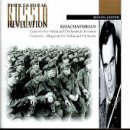| All Artists: Tchaikovsky, Kogan Title: Concerto for Violin & Orchestra in D Minor Members Wishing: 0 Total Copies: 0 Label: Russian Revelation Release Date: 4/21/1998 Genre: Classical Styles: Forms & Genres, Concertos, Historical Periods, Modern, 20th, & 21st Century, Instruments, Strings Number of Discs: 1 SwapaCD Credits: 1 UPCs: 182478417228, 5032636100651, 503263610065 |
Search - Tchaikovsky, Kogan :: Concerto for Violin & Orchestra in D Minor
 | Tchaikovsky, Kogan Concerto for Violin & Orchestra in D Minor Genre: Classical
|
Larger Image |
CD Details |
CD ReviewsMajor interpretations Discophage | France | 08/01/2009 (5 out of 5 stars) "Russian Revelation's booklet gives 25 June 1951 as the date for this recording of Khachaturian's Violin Concerto and I hear no audience noise, so I assume this is a transfer of the studio recording that was first published on LP by Melodiya in the 1950s. No surface noise that I can perceive, so the transfer must come from some (original ?) tape. Sonics are mono but vivid. That version came a few years after the first recording by the dedicatee and premiere performer, David Oistrakh, with Alexander Gauk conducting, in 1942 (Khachaturian: Concerto for violin in Dm; Myaskovsky: Concerto for violin in Dm), and it also predates the second recording by the same, this time (like here) under the conductor's baton, made for HMV with the London Philharmonia in 1954 (Aram Khachaturian: Masquerade; Gayaneh; Violin Concerto). Kogan also re-recorded the Concerto, in the west, in early stereo and under Pierre Monteux, in 1958 (Khachaturian: Concerto for violin in Dm; Prokofiev: Alexander Nevsky, Op. 78).
I haven't heard Oistrakh's first take with Gauk, but all three subsequent versions (the two composer-conducted ones and Kogan's remake) are excellent. In fact, they are very similar. The composer's conception hasn't changed in the three years interval between this one and his London recording, and neither has Kogan's in 1958. The tempo is always forward-moving and the orchestra biting, there is no lingering around for sentimental effect, making the lyricism, I find, all the more searing. Kogan's tone may be slightly wirier than Oistrakh's in the fast passages, but it is in character with the music. The advantages of Kogan's first version: better sound than Oistrakh-Khachaturian-Philharmonia despite the earlier vintage (the recording pickup afforded to the Philharmonia makes it sound recessed and uni-dimensional), better solo-orchestra balance than in 1958 (where the stereo recording, while giving more bloom to the orchestra, embedded the violin into the orchestra), and complete first movement cadenza, without cut (Oistrakh played his own concoction, and Kogan in 1958 he exercised a big cut). This is a great version, a truly historical one, as indispensable to the admirer of the Violin Concerto as Oistrakh's. The Concerto-Rhapsody for Violin and Orchestra from 1961 is the first in a series of three, the two others being for cello (1963) and piano (1968), offering a nice pendant to the three Concertos (Piano 1936 and Cello 1946). This version is definitely a live one - Russian Revelation claims it the "first performance recording", from November 3, 1962, but Onno van Rijen's Soviet Composer's Page (available on the net) indicates that the premiere took place on October 7 of the same year in Yaroslavl, with the Yaroslavl Philharmonic under I. Gusman, and I'm inclined to believe him. The sound doesn't show all that striking an improvement over the 1951 recording - I wouldn't stake my hand even that it is in stereo, despite the vintage, but it is nonetheless (like the Concerto) very satisfactory, offering vivid presence of the soloist and clear orchestra. There are a few coughs at the beginning, not distracting. The composition is more dramatic and angular than the Violin Concerto, but still highly lyrical (in a more anguished mood) and with all these beautifully sensuous tunes so characteristic of the composer. It is the first recording to enter my collection, but one can assume that the interpretation (Kondrachin conducting) is authoritative. These two same recordings have been reissued in Brilliant's Kogan collection, Leonid Kogan Edition [Box Set]. " |

 Track Listings (4) - Disc #1
Track Listings (4) - Disc #1